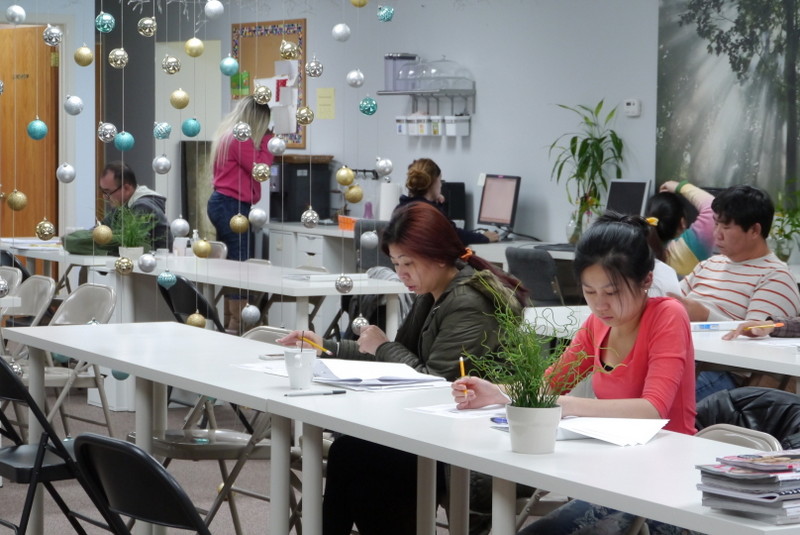Nail salon workers to get access to Asian language licensing exams
By Odette Yousef

Nail salon workers to get access to Asian language licensing exams
By Odette YousefIt’s no surprise to walk into a nail salon and find mostly Asian staff. But despite a concentration of Vietnamese, Korean and Chinese professionals in the cosmetology and nail technology industries, Illinois has never offered the licensing exams in Asian languages. Now the state is looking to change that.
“You know why I opened a cosmetology school in Chinatown?” said Mora Zheng, owner of the Elle International Beauty Academy in Chinatown. “Because I just want to let more Chinese people work legally, have good benefits, have a good salary.”
As a small group of students sat huddled around a table in a nearby room, applying fake nail tips to plastic mannequin hands, Zheng explained that jobs in the beauty industry are popular with Asian immigrants because the schooling only takes a few months. She said that allows them to start earning money quickly. According to the Bureau of Labor Statistics, average yearly income for manicurists and pedicurists in Illinois is $26,720.
But Zheng said she’s noticed a disturbing trend: lots of students finish school, but don’t get licensed to practice.
“Some people, they (are) scared (of the) English written examination,” said Zheng, referring to the licensing exam administered by the Illinois Department of Financial and Professional Regulation. “They’re scared to fail.”
The IDFPR offers the cosmetology and nail technician licensing exams in English and Spanish. Zheng said it’s time to add Chinese, because otherwise, qualified professionals end up working illegally in nail salons, and they are not paid fair wages.

Shaw believes expanding language access to the licensing exams will have far-ranging, positive effects. She argued that not only would it make it easier for immigrants to earn an honest living, but that the overall state economy would benefit by easing the way for small business owners.
Still, Shaw was surprised to learn from Zheng that the licensing exams weren’t already offered in Asian languages.
“You know, I really don’t believe there was any intent to discriminate,” Shaw said. “This is one of the downsides of not having someone that’s elected that has an Asian-American background. We have zero state legislators that are Asian-American.”
But Shaw and Zheng found an ally in the office Governor Pat Quinn with his appointment of Theresa Mah. Mah is a longtime activist and organizer in Chicago who serves as Gov. Quinn’s chief liaison to the Asian-American community. The IDFPR will soon offer the cosmetology licensing exam in Chinese, and plans to offer translations of the nail technician licensing exam in Korean and Vietnamese. According to Nails Magazine, Illinois is among the ten states with the largest number of Vietnamese nail technicians.
But some argue that translating the licensing exams could harm the industry.

Hyunh said some of her relatives immigrated two decades ago to California, where they had successful nail shops. But she said their fortunes changed once California began offering its written manicurist exam in Vietnamese in 1996.
“It got exploded so big over there that the prices started dropping,” said Hyunh. “So they had to find new states to start this whole new nail industry again.” Hyunh said her aunts and uncles fled California to start new businesses in Chicago, a relatively unsaturated market.
Could something similar happen here? Chicago zoning laws prohibit personal service establishments, including nail salons, to locate within 1000 feet of each other. But Mora Zheng says even if competition heats up, that’s no reason not to translate the tests. She tells her students if they do their best, they’ll be fine.
“Prepare yourself well, (and) you don’t need to worry about others,” Zheng declared. “That’s why I tell my students, ‘in your heart, always sunshine.’”
Hyunh said even though most of her students don’t speak English as a native language, she’s crafted a bilingual curriculum that helps them pass the licensing exams in English. She understands that translating the tests could help some immigrants get on their feet faster, but Hyunh said she won’t be changing her teaching methods.
Odette Yousef is WBEZ’s North Side Bureau reporter. Follow her @oyousef and @WBEZOutLoud.